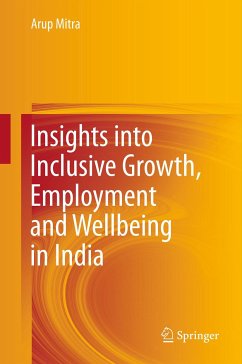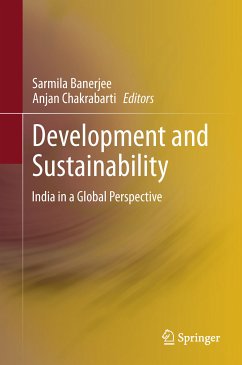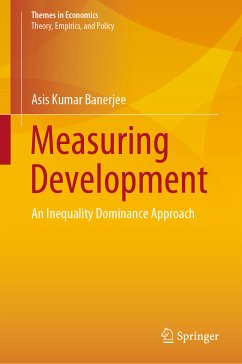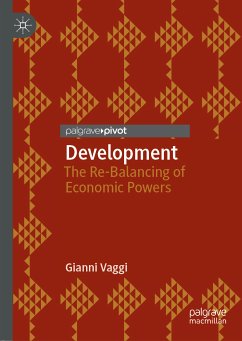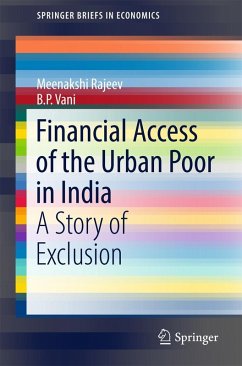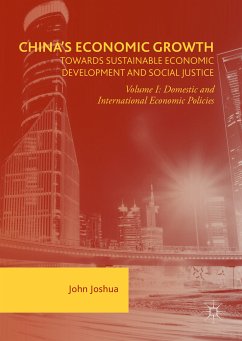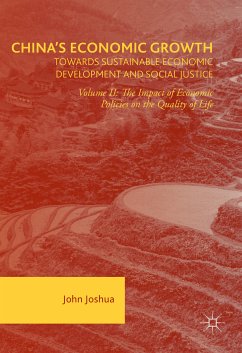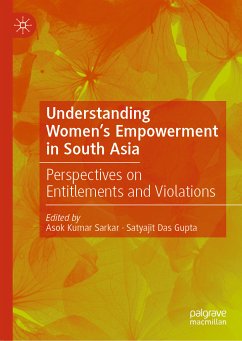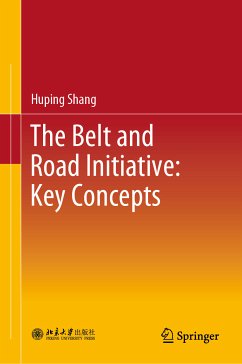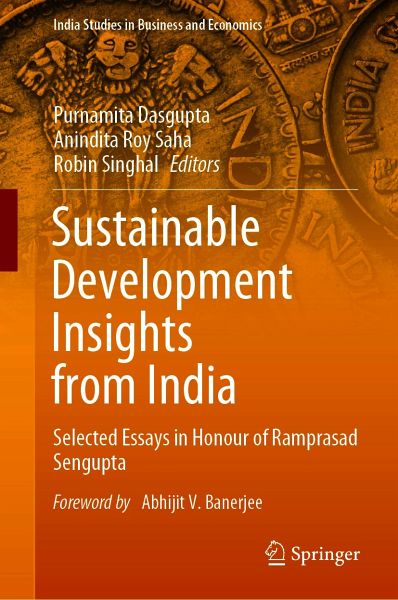
Sustainable Development Insights from India (eBook, PDF)
Selected Essays in Honour of Ramprasad Sengupta
Redaktion: Dasgupta, Purnamita; Singhal, Robin; Saha, Anindita Roy
Versandkostenfrei!
Sofort per Download lieferbar
112,95 €
inkl. MwSt.
Weitere Ausgaben:

PAYBACK Punkte
56 °P sammeln!
This volume is a collection of essays that provide a comprehensive coverage of multiple aspects of the discourse on environment, development and sustainability. It is designed to bring in a host of perspectives highlighting the synergies and the trade-offs in this debate, showcasing research along with policy implications of putting research into use.The global discussion on sustainability paints the broad canvas for this book. This volume aims to probe some contemporary issues that will help in understanding the sustainability narrative in India. The topics span over a host of questions on en...
This volume is a collection of essays that provide a comprehensive coverage of multiple aspects of the discourse on environment, development and sustainability. It is designed to bring in a host of perspectives highlighting the synergies and the trade-offs in this debate, showcasing research along with policy implications of putting research into use.
The global discussion on sustainability paints the broad canvas for this book. This volume aims to probe some contemporary issues that will help in understanding the sustainability narrative in India. The topics span over a host of questions on energy, environment, natural resources and related constituents of development. The discourse further extends to the role of economic modelling, public policy debates, political intervention, stakeholders' response, community participation and so on. The discussions are often based on empirical support, review of existing literature as well as policy analysis. With an ultimate aim to understand the overall development narrative of the people of India, the discourse takes in its ambit the nuances of resource utilisation, economic growth, COVID-19 impacts, competitiveness and market structures, urbanization, sectoral reforms, environmental hazards, climate change, pollution, natural resource accounting and management to name a few.
The book is divided into four sections, namely, The Big Picture: Evolving Perspectives; The Energy Scenario: Dilemmas and Opportunities; Sustainability Cross-Cuts: Developmental Aspects and Externality Empirics: Knowledge and Practice. The first section contains commentaries on the overarching themes of economic growth, development and sustainability. It presents some emerging perspectives on the developmental crisis that has emerged through the environmental lens with additional focus on the need for inclusion of creativity, knowhow, technology and financial resources to achieve the ambitious SDG targets. The secondsection brings out the dilemmas and opportunities in the energy sector, that has been a key player in discussions of sustainability, especially for India where significant technological advances in conventional forms of energy supply coexists with fairly low levels of per capita energy consumption and energy security is a key challenge. The section on sustainability crosscuts attempts to highlight the problems and processes of mainstreaming the sustainability question into conventional thinking through the concepts of a circular economy, green accounting techniques, institutional and governance structures, public policy and inclusive growth, amongst others. The last section presents some empirical studies on environmental externalities, the unaccounted environmental effects of economic production and consumption and finally the behavioural aspects of the stakeholders that are crucial in the larger narrative of sustainable development.
This edited volume contains contributions of reputed scholars from various Indian universities, research institutions and professionals from outside academia, who are proven experts in their fields. The link between policy, practice, and well-being of the large vulnerable population of India is the major focus of enquiry that will help researchers, practitioners and policy planners in conducting further research in energy, environment, resource and linked areas of development economics. General readers with an active interest in energy, environment, and economic development are also likely to find this book an interesting read, especially in the times of several environmental challenges facing humankind.
The global discussion on sustainability paints the broad canvas for this book. This volume aims to probe some contemporary issues that will help in understanding the sustainability narrative in India. The topics span over a host of questions on energy, environment, natural resources and related constituents of development. The discourse further extends to the role of economic modelling, public policy debates, political intervention, stakeholders' response, community participation and so on. The discussions are often based on empirical support, review of existing literature as well as policy analysis. With an ultimate aim to understand the overall development narrative of the people of India, the discourse takes in its ambit the nuances of resource utilisation, economic growth, COVID-19 impacts, competitiveness and market structures, urbanization, sectoral reforms, environmental hazards, climate change, pollution, natural resource accounting and management to name a few.
The book is divided into four sections, namely, The Big Picture: Evolving Perspectives; The Energy Scenario: Dilemmas and Opportunities; Sustainability Cross-Cuts: Developmental Aspects and Externality Empirics: Knowledge and Practice. The first section contains commentaries on the overarching themes of economic growth, development and sustainability. It presents some emerging perspectives on the developmental crisis that has emerged through the environmental lens with additional focus on the need for inclusion of creativity, knowhow, technology and financial resources to achieve the ambitious SDG targets. The secondsection brings out the dilemmas and opportunities in the energy sector, that has been a key player in discussions of sustainability, especially for India where significant technological advances in conventional forms of energy supply coexists with fairly low levels of per capita energy consumption and energy security is a key challenge. The section on sustainability crosscuts attempts to highlight the problems and processes of mainstreaming the sustainability question into conventional thinking through the concepts of a circular economy, green accounting techniques, institutional and governance structures, public policy and inclusive growth, amongst others. The last section presents some empirical studies on environmental externalities, the unaccounted environmental effects of economic production and consumption and finally the behavioural aspects of the stakeholders that are crucial in the larger narrative of sustainable development.
This edited volume contains contributions of reputed scholars from various Indian universities, research institutions and professionals from outside academia, who are proven experts in their fields. The link between policy, practice, and well-being of the large vulnerable population of India is the major focus of enquiry that will help researchers, practitioners and policy planners in conducting further research in energy, environment, resource and linked areas of development economics. General readers with an active interest in energy, environment, and economic development are also likely to find this book an interesting read, especially in the times of several environmental challenges facing humankind.
Dieser Download kann aus rechtlichen Gründen nur mit Rechnungsadresse in A, B, BG, CY, CZ, D, DK, EW, E, FIN, F, GR, HR, H, IRL, I, LT, L, LR, M, NL, PL, P, R, S, SLO, SK ausgeliefert werden.



